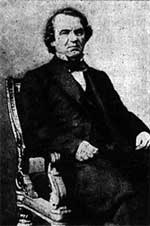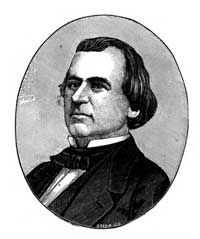| Andrew Johnson, the seventeenth President of the United States (1865-69), was the first Vice President to take over the presidency because of an assassination. He was also the first President to be impeached by the Congress. In the Senate trial he held onto the presidency by a margin of only a single vote. He is the only President besides Bill Clinton to have been impeached. On the positive side, Alaska was purchased during his administration.

Andrew Johnson was born in Raleigh, North Carolina on December 29, 1808. Like Lincoln, he came from a poor family. His father died when he was three, and his mother, Mary Johnson, worked as a seamstress to support him and his three brothers. He taught himself to read and learned a trade as a tailor's apprentice. In 1826 he moved to Tennessee where he married Eliza McCardle, who taught him arithmetic and writing. They had five children. One son served and was killed in the Civil War.

 This self-educated tailor rose in Tennessee politics to organize a workingman's party that elected him alderman and, later, mayor of Greeneville. His humble beginnings and homespun qualities endeared him to the local people. In 1835 he was elected to the Tennessee House of Representatives, where he served until 1843. While there he became a straightforward spokesperson for the local mountaineers and farmers. He went on to represent them in the United States Congress for ten years. While he supported slavery, it was not much of an issue in his district. This self-educated tailor rose in Tennessee politics to organize a workingman's party that elected him alderman and, later, mayor of Greeneville. His humble beginnings and homespun qualities endeared him to the local people. In 1835 he was elected to the Tennessee House of Representatives, where he served until 1843. While there he became a straightforward spokesperson for the local mountaineers and farmers. He went on to represent them in the United States Congress for ten years. While he supported slavery, it was not much of an issue in his district.
When redistricting threatened his election chances, he ran, instead, for Governor of Tennessee and won. In 1855 he was re-elected. One of his primary focal points was education, and he promoted a school tax, supported equal pay for female teachers, and established a state library.
In 1857 he was elected to the United States Senate, still adhering to the Democratic party's views opposing antislavery agitation and lowering tariffs. His dramatic break with the Democrats came in 1860 when he violently opposed secession and he refused to give up his position in the Senate despite the opposition to him in his own state. When Tennessee seceded from the Union in June of 1861, Andrew Johnson refused to give up his Senate seat and did not join the Confederacy. This caught the attention of Abraham Lincoln, who appointed him military governor of Tennessee.

 He was nominated to be Lincoln's Vice President candidate in the 1864 election because it was thought his former Democratic base would broaden Lincoln's reelection chances. They won. A little over a month later, on April 15, 1865, Abraham Lincoln was assassinated and Andrew Johnson became the seventeenth President of the united States. He was nominated to be Lincoln's Vice President candidate in the 1864 election because it was thought his former Democratic base would broaden Lincoln's reelection chances. They won. A little over a month later, on April 15, 1865, Abraham Lincoln was assassinated and Andrew Johnson became the seventeenth President of the united States.
Being from a Southern state, Johnson quarreled with Congress on Reconstruction issues and the readmission of states into the Union after the Civil War. After an initial period of bitterness toward the Confederacy, he vetoed several bills that sought to punish the South for the war. In the Congressional elections of 1866 Johnson lost a large number of supporters, and the new Congress had enough votes to override Johnson's vetoes. The Reconstruction Act of 1867 replaced the South's civil governments with military rule and set Negro suffrage and ratification of the Fourteenth Amendment as terms for getting it back.
President Johnson battled with Congress on almost every issue. Congress countered with The Tenure of Office Act, which prevented the President from removing certain appointed officials on his own authority. Another bill, the Army Appropriations Act, contained provisions designed to undermine the President's right to command the Army. When Johnson tried to unseat Secretary of War, Edwin Stanton, the House passed a Resolution of Impeachment against him; but he was acquitted by one vote in the Senate.

After his term as President he retired to Tennessee. In 1873 he returned to the Senate, but died shortly thereafter on July 3, 1875.
|

